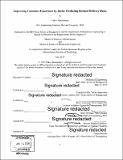Improving customer experience by better predicting revised delivery dates
Author(s)
Berenshteyn, Yakov.
Download1119537409-MIT.pdf (11.21Mb)
Other Contributors
Sloan School of Management.
Massachusetts Institute of Technology. Department of Mechanical Engineering.
Leaders for Global Operations Program.
Advisor
Bruce Cameron and Donald Kieffer.
Terms of use
Metadata
Show full item recordAbstract
Historically, Dell has used a variety of methods to calculate a customer order's initial Estimated Delivery Date (EDD) and a subsequent Revised Delivery Date (RDD) as necessary. Multiple tools arose to meet diverse business needs, regulatory requirements, and IT capabilities of particular geographies and sales channels. However, Dell believes the inability to upkeep all tools to high standards has hurt the customer experience, as evidenced by Net Promoter Score (NPS) metrics, customer care calls, and executive escalations related to Order Experience. This thesis specifically focuses on improving the calculation of RDDs in the Europe/Middle East/Africa (EMEA) region so as to improve the percentage of delayed orders that arrive on time to the first RDD. The thesis proposes a deterministic, lead-time-based RDD algorithm. The algorithm tests the hypothesis that order stage at RDD generation should directly inform RDD. Resulting formulas are designed to integrate into Dell's Delivery Promise platform for its up-to-date lead time data. The formula development process starts with existing Delivery Promise formulas and modifies them based on analysis of historic data on RDD performance in EMEA. In commercial implementation, the new formulas show a ~20 percentage point improvement in accuracy to first RDD, from approximately 50% to 70%. The result is short of longterm aspirations of 9 0 -9 5% accuracy to first RDD, but successfully establishes a new, improved baseline. Additionally, the thesis presents a simulation model for prototyping of RDD calculation methodologies. A simulation architecture is presented with proof-of-concept results as a case study. The simulation is shown to enable rapid parallel testing of various RDD algorithms of one's choosing on a given simulated set of order data. This is proposed as a test tool for future proposed RDD methodologies, although proof of viability is currently limited by reliance on simulated rather than real lead time and order data. Finally, the thesis contextualizes RDD algorithm development (a) within a design thinking-driven framework, (b) alongside a broader capabilities-driven strategy for evaluating RDD methodologies, and (c) in terms of discrete RDD generation rules and choices of metrics.
Description
Thesis: M.B.A., Massachusetts Institute of Technology, Sloan School of Management, 2019, In conjunction with the Leaders for Global Operations Program at MIT Thesis: S.M., Massachusetts Institute of Technology, Department of Mechanical Engineering, 2019, In conjunction with the Leaders for Global Operations Program at MIT Cataloged from PDF version of thesis. Includes bibliographical references (page 63).
Date issued
20192019
Department
Sloan School of Management; Massachusetts Institute of Technology. Department of Mechanical Engineering; Leaders for Global Operations ProgramPublisher
Massachusetts Institute of Technology
Keywords
Sloan School of Management., Mechanical Engineering., Leaders for Global Operations Program.